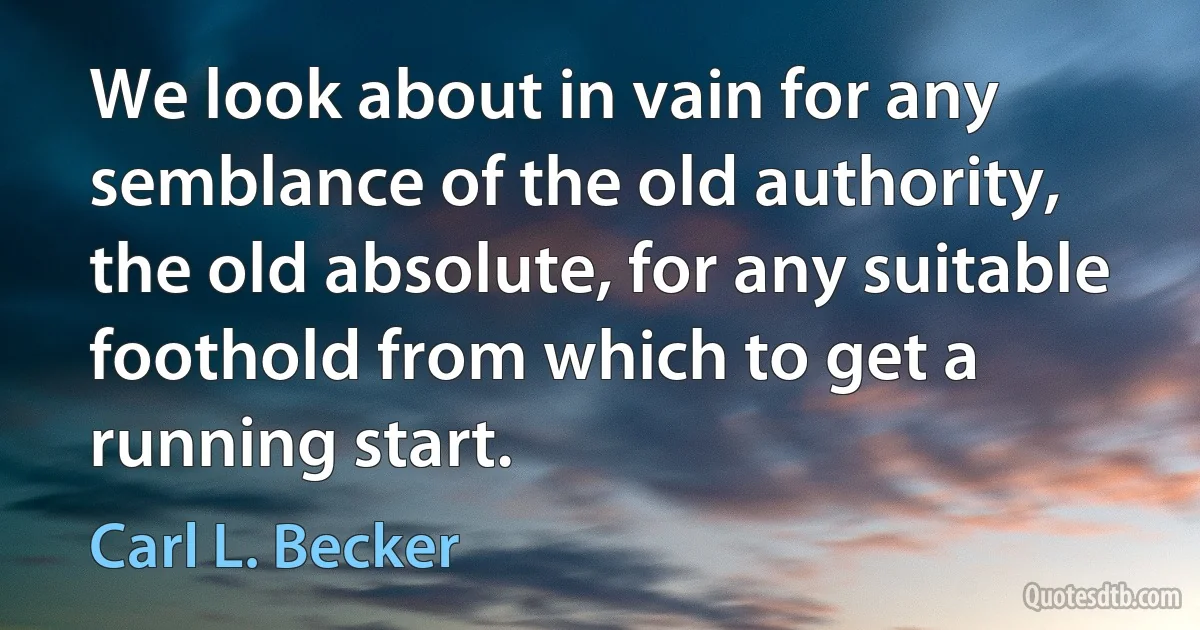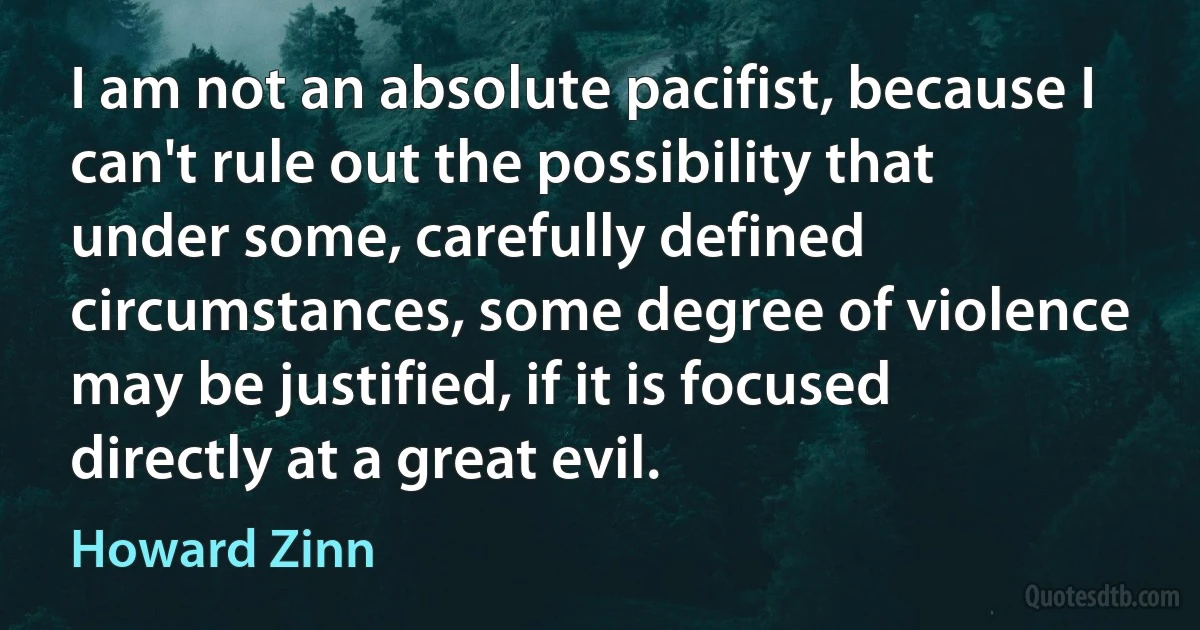Absolute Quotes - page 14
It's an absolute honor to be taking part in the pageant for the Diamond Jubilee. This is a once-in-a-lifetime opportunity and will be a moment in history that will always be remembered. I'm really looking forward to being out on the river with friends and family. To mark this historic moment will be extremely special.

Steve McFadden
I wanted to know the best of the life of one (Muhammad) who holds today an undisputed sway over the hearts of millions of mankind. I became more than ever convinced that it was not the sword that won a place for Islam in those days in the scheme of life. It was the rigid simplicity, the utter self-effacement of the Prophet the scrupulous regard for pledges, his intense devotion to his friends and followers, his intrepidity, his fearlessness, his absolute trust in God and in his own mission. These and not the sword carried everything before them and surmounted every obstacle.

Mahatma Gandhi
To prevent Incitatus, his favourite horse, from being disturbed he always picketed the neighbourhood with troops on the day before the races, ordering them to enforce absolute silence. Incitatus owned a marble stable, an ivory stall, purple blankets, and a jewelled collar; also a house, a team of slaves, and furniture – to provide suitable entertainment for guests whom Gaius invited in its name. It is said that he even planned to award Incitatus a consulship.

Suetonius
The effective decisions can only be made by the independently thinking and adequately informed human individuals and their telepathically intercommunicated wisdom--the wisdom of the majority of all such human individuals--qualifying for continuance in Universe as local cosmic problem-solvers--in love with the truth and in individually spontaneous self-commitment to absolute faith in the wisdom, integrity, and love of God, who seems to wish Earthian humans to survive.

Buckminster Fuller
The Present Age, according to my view of it, stands in that Epoch which in my former lecture I named the THIRD, and which I characterized as the Epoch of Liberation-directly from the external ruling Authority, indirectly from the power of Reason as Instinct, and generally from Reason in any form; the Age of absolute indifference towards all truth, and of entire and unrestrained licentiousness:–the state of completed sinfulness.

Johann Gottlieb Fichte
The Divine Existence (Daseyn),-his Existence, I say, which, according to the distinction already laid down, is his (Manifestation and Revelation of himself-is absolute- only through itself, and of necessity, LIGHT:-namely, y the inward and spiritual Light. This Light, left to itself, separates and divides itself into an infinite multiplicity of individual rays; and in this way, in these individual rays, becomes estranged from itself and its | original source. But this same Light may also again concentrate itself from out this separation, and conceive and comprehend itself as One, as that which it is in itself,-the Existence and Revelation of God; remaining indeed, even in this conception, that which it is in its form,-Light; but yet in this condition, and even by means of this very condition, announcing it-to self as having no real Being in itself, but as only the, Existence and Self-Manifestation of God.

Johann Gottlieb Fichte
My immediate consciousness, my absolute perception, cannot go beyond myself, - I have immediate knowledge only of myself, whatever I know further I know only by reasoning, in the same manner in which I have come to those conclusions concerning the original powers of Nature, which certainly do not lie within the circle of my perceptions. I, however, - that which I call myself, - am not the man-forming power of Nature, but only one of its manifestations; and only of this manifestation am I conscious, not of that power, whose existence I have only discovered from the necessity of explaining my own.

Johann Gottlieb Fichte
The free being with absolute freedom proposes to itself certain ends. It wills because it wills, and the willing of an object is itself the last ground of such willing. Thus we have previously determined a free being, and any other determination would destroy the conception of an Ego, or of a free being. Now, if it could be so arranged that the willing of an unlawful end would necessarily - in virtue of an always effective law - result in the very reverse of that end, then the unlawful will would always ANNIHILATE ITSELF. A person could not will that end for the very reason because he did will it; his unlawful will would become the ground of its own annihilation, as the will is indeed always its own last ground.

Johann Gottlieb Fichte
This education, therefore, results at the very outset in knowledge which transcends all experience, which is abstract, absolute, and strictly universal, and which includes within itself beforehand all subsequently possible experience. On the other hand, the old education was concerned, as a rule, only with the actual qualities of things as they are and as they should be believed and rioted, without anyone being able to assign a reason for them. It aimed, therefore, at purely passive reception by means of the power of memory, which was completely at the service of things. It was, therefore, impossible to have any idea of the mind as an independent original principle of things themselves.

Johann Gottlieb Fichte
The central psychological endeavor of Kierkegaard may be summed up under the heading of the question he pursued relentlessly: How can one become an individual? The individual was being swallowed up on the rational side by Hegel's vast logical "absolute Whole," on the economic side by the increasing objectification of the person, and on the moral and spiritual side by the soft and vapid religion of his day. Europe was ill, and was to become more so, not because knowledge or techniques were lacking but because of the want of passion, commitment. ""Away from Speculation, away from the System," he called, and "back to reality!"

Rollo May
In the winter of 1841 Schelling gave his famous series of lectures at the University of Berlin before a distinguished audience including Kierkegaard, Burckhardt, Engels, Bakunin. Schelling set out to overthrow Hegel, whose vast rationalist system including the identification of abstract truth with reality and the bringing of all history into an "absolute whole,” held immense and dominant popularity in the Europe of the middle of the nineteenth century. – 1844 Kierkegaard published Philosophical Fragments, and two years later he wrote the declaration of independence for existentialism, Concluding Unscientific Postscript to Philosophical Fragments. Also in 1844 there appeared the second edition of Schopenhauer's The world as will and idea,.. central emphasis "will” along with "idea” -- two related works by Marx 1844-45 – "attacked abstract truth' as "ideology” "using Hegel as his whipping boy” "men and groups bring truth into being” "money economy turns people into things”.

Rollo May
God thus includes the world; he is, in fact, the totality of world parts, which are indifferently causes and effects. Now AR [absolute perfection in some respects, relative perfection in all others] is equally far from either of these doctrines; thanks to its two-aspect view of God, it is able consistently to embrace all that is positive in either deism or pandeism. AR means that God is, in one aspect of himself, the integral totality of all ordinary causes and effects, but that in another aspect, his essence (which is A), he is conceivable in abstraction from any one or any group of particular, contingent beings (though not from the requirement and the power always to provide himself with some particulars or other, sufficient to constitute in their integrated totality the R aspect of himself at the given moment).

Charles Hartshorne
These distinctions make sense only when AR [absolute perfection in some respects, relative perfection in all others] is assumed (hence Spinoza's failure, who assumed mere A). Just as AR is the whole positive content of perfection, so CW, or the conception of the Creator-and-the-Whole-of-what-he-has-created as constituting one life, the super-whole which in its everlasting essence is uncreated (and does not necessitate just the parts which the whole has) but in its de facto concreteness is created – this panentheistic doctrine contains all of deism and pandeism except their arbitrary negations. Thus ARCW, or absolute-relative panentheism, is the one doctrine that really states the whole of what all theists, if not all atheists as well, are implicitly talking about.

Charles Hartshorne
The fundamental article of my political creed is that despotism, or limited sovereignty, or absolute power is the same [whether] in a majority of a popular assembly; an aristocratic council; or oligarchical junto and a single emperor - equally arbitrary, cruel, bloody and in every respect diabolical.

John Adams
An hereditary chief, strictly limited, the right of war vested in the legislative body, a rigid economy of the public contributions, and absolute interdiction of all useless expenses, will go far towards keeping the government honest and unoppressive. But the only security of all is in a free press. The force of public opinion cannot be resisted, when permitted freely to be expressed. The agitation it produces must be submitted to. It is necessary, to keep the waters pure.

Thomas Jefferson



